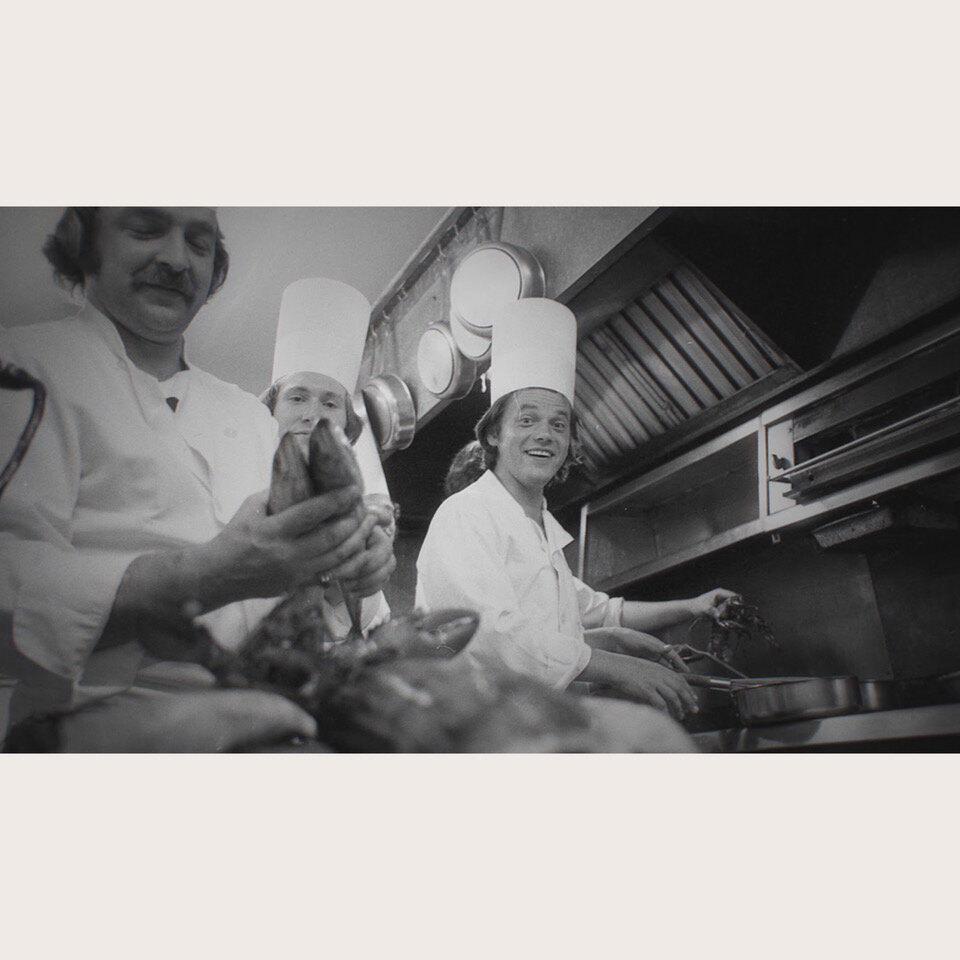Tribeca Film Festival: David Gelb’s Wolfgang: “Cooking Was A Show, And He Was The Star”
Photo / Video Credit: Courtesy of Tribeca Festival
Director David Gelb, an Emmy®- and GRAMMY®-nominated producer, director and founding partner of Supper Club, a production company, is best known for his highly revered works Jiro Dreams of Sushi and Netflix’s Chef’s Table. It would be easy to tag Gelb as the “food director,” however a closer look into his directorial projects reveals him as much more than that; He is more of a “human soul director” as he cinematically captures intricate emotions, motivations, and memories. WOLFGANG, which premiered at the Tribeca Film Festival on June 12th, follows the story of Wolfgang Puck, the world’s most famous chef. In much the same way that Barbara Lazaroff, Puck’s ex-wife notes in the documentary, “Cooking was a show, and he [Wolfgang] was the star,” Gelb allowed Puck to tell his story with simmering Wiener Schnitzel and Joan Collins- inspired dill smoked salmon pizzas as the gorgeous backdrop to a story taking center stage about Wolfgang Puck as a human, not a character.
Photo / Video Credit: Courtesy of Tribeca Festival
Wolfgang Puck describes life as hopping on a train and hoping it takes you to where you are meant to go. While this is true, WOLFGANG explores the train ride and all of its working parts. The documentary traverses the dark and dense forest of his childhood in which lies a whipping stick of a stepfather whose cruel words echoed in Puck’s ears for decades after. His passion for food, brought about from cooking with his mother and grandmother as a young boy, was the light that broke through the trees, revealing a safe path out of the darkness. While passion was the famed train’s fuel, the echo of words both cruel and kind throughout life are the guiding rails on which the train runs. Puck recounts that he spent his whole life hating his stepfather and trying to prove him wrong, but came to a realization that he was not running away, but going after what he loved. The two, however, are not mutually exclusive.
Photo / Video Credit: Courtesy of Tribeca Festival
David Gelb’s train moved toward creating WOLFGANG by the fuel of his passion for the culinary world and the echo of Puck’s kind words. In his Director Statement, he recalls, at 10 years old, eating with his Father at Spago---Puck’s California celebrity hotspot restaurant in the ‘80s and ‘90s--- and meeting Wolfgang Puck; He writes, “he came to our table and warmly greeted my dad like he was an old friend. Noting the wiener schnitzel on my plate, he said to me, ‘Hello there. You look like you are from Austria!’ I felt so special that the iconic chef took the time to form a personal connection with me. Had it not been for this moment with Wolfgang, I doubt that I would have gone on to make Jiro Dreams of Sushi or Chef’s Table.” This treasured experience almost certainly impacted how tender and carefully directed WOLFGANG is, as it affords the viewer the same luxurious experience of being greeted like an old friend who comes to know and understand Puck’s inner monologue.
Photo / Video Credit: Courtesy of Tribeca Festival
Perhaps the most touching element of the film is its deviation from documentaries that draw a line between the child and adult version of a person. Wolfgang Puck’s fearful inner childhood monologue never truly went away and is juxtaposed against his monumental achievements. After his revolutionizing the way Americans eat through introducing fresh produce, creating the open kitchen concept with the incredible support and mind of Barbara Lazaroff, and moving a chef’s position from behind the curtain to center stage, he still carried a visceral fear that at “any moment the coach would turn back into a pumpkin.” Despite Gelb’s own warm childhood feelings towards Puck, the film also did not seek to glorify Wolfgang Puck as a hero, but instead introduced him as a high achieving human who, like anyone else, makes mistakes that are primarily told kindly through the perspectives of others- his children and his ex-wife.
Photo / Video Credit: Courtesy of Tribeca Festival
At the end of the documentary, many state what they believe to be the moral of Wolfgang Puck’s story- some say it is to “believe in yourself, know what you’re good at, and to take chances” while others say it is to “not be afraid” or to “love and lead with your heart and your mind” while Puck says it’s to “have purpose and follow your dreams.” After watching, I believe the moral of his story is to “do it afraid.” Puck is not fearless- no one really is- but we must step on the train’s platform even with the depth of the woods looming behind us.
WOLFGANG is set to be released on Disney+ on June 25th, below is the trailer! https://www.youtube.com/watch?v=xDlGkFoj1TY
Article by Tessa Swantek, Contributing Editor, PhotoBook Magazine
Tearsheets by Isabella Grieco, Graphic Design, PhotoBook Magazine








